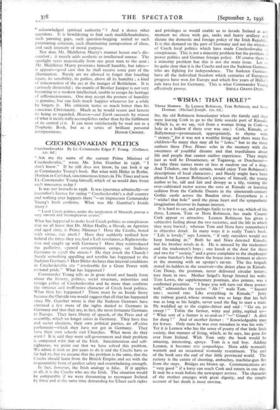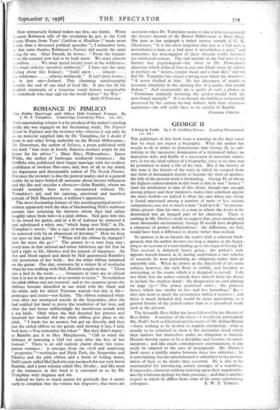" WISHA ! THAT HOLE ? "
So, the old Robinson housekeeper when the family said they were leaving Cork to go to the little seaside port of Kinsale. (Which is, as we say, rich from a woman living in Cork—a hole in a hollow if there ever was one.) Cork, Kinsale, or Ballymoney—pronounced, appropriately, to rhyme with " stoney,',' for it was not a wealthy living and there were five children-4o many they may all be " holes," but to the three authors these Three Homes echo in the memory with the sweetness of youthful dreams and that trustfulness about life and people that cannot outlive experience. They might just as well be Douarnenez, or Taganrog, or Dorchester— to take three names more or less at random out of a Map. And Tchekov, one feels certain, would enjoy Tom Robinson's descriptions of local characters ; and Hardy might have been pleased by Lennox Robinson's picture of himself, the young author to be, tall and fair and droopy as a lily, visiting the over-cultivated rector across the cove at Kinsale or learning sedition from the Catholic Daunts in the nineteenth-century Gothic castle across the Bandon river. Everywhere is a " wisha! that hole" until the pious heart and the sympathetic imagination discover its human interest.
It is hard to say, and perhaps futile to try to say, which of the three, Lennox, Tom or Nora Robinson, has made County Cork appear so attractive. Lennox Robinson has given a subjective feeling about the two rectories, and the life in which they were buried ; whereas Tom and Nora have remembered in objective detail. In many ways it is really Tom's book. " Life is lovely," says Lennox, " if only outsiders would not keep breaking in." Both he and Nora detested Kinsale, but his brother revels in it. He is amused by the tradesmen and the tradesmen's boys ; one knock at the door for these and two for " society," and a grave complaint to the shopkeeper if some butcher's boy threw the house into a ferment at eleven in the morning with an upstart's rat-tat. The fire brigade stored its ladders in the reservoir—the driest place in Kinsale. Con Deasy, the postman, never delivered circular letters ; tore them in two. Mother Seigel's Syrup littered his wake. Tom Lewis, the supplementary postman, also printer, was a confirmed pessimist. " I hope you will turn out these posters well," admonishes the rector. " Ah ! " wails Tom. " Second rate ; second rate. Like everything in Kinsale." Jerry the railway guard, whose stomach was so large that his belt was as long as his height, never used the flag to start a train. He waddled up to the engine-driver and said : " Go on, ye sweep ! " Tobin the farmer, witty and pithy, replied to- " What sort of a farmer is so-and-so ? "—" Grand ! A divil for dung ! " And of another farmer : " Knowledgeable man for horses. Only mare he was ever mistaken in was his wife." Yet it is Lennox who has the sense of poetry of that little Irish society, that manner of living, which, as he says, has gone for ever from Ireland. With Tom only the book would be amusing, interesting, aperfu. Tom is a real boy. Adding Lennox, it becomes tres sympathique. Nora adds womanly warmth and an occasional womanly resentment. The end of the book sees the end of that little provincial world. The rectory is the centre of shooting, ambushes, machine-gun fire from the steps. Bridges are blown up. Communications are " very good " if a lorry can reach Cork and return in one day. It may be a week before the newspaper arrives. The character of the mother emerges with great dignity, and the simple account of her death is most moving.
How strenuously Ireland makes one live, one thinks. When Lennox Robinson tells of the revelation he got, in the Cork Opera House, from Yeats' Cathleen ni Houlihan ("made more rebels than a thousand political speeches "), I remember how; in that same theatre, Robinson's Patriots did exactly the same thing for me. After Parnell, he writes : " From the founda- t oils the country now had to be built anew. We must educate ourselves. . . . We must spend twenty years in the wilderness. We must criticise ourselves ruthlessly." I have just the same feeling about this Ireland ; " build anew . . . educate . . . the wilderness . . . criticise-ruthlessly." It isn't three homes ; it is just one—Ireland. This charming autobiography records the end of one kind of local life. It also has all the implicit continuity of a veracious social history recognisable to everybody who may sigh for the world before " the War."
SEAN O'FaoLitN.







































 Previous page
Previous page